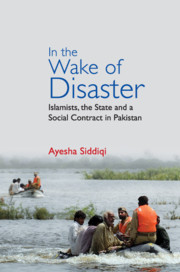Book contents
- Frontmatter
- Dedication
- Contents
- List of Figures, Boxes and Tables
- Acknowledgements
- Introduction: Setting the Scene
- 1 A Social Contract: State–Citizen Relations and Unfolding Disasters
- 2 The State as a Complex Web of Social Relations
- 3 The Ethnographic Social Contract
- 4 Advancing ‘Disaster Citizenship’
- 5 The Failing ‘Islamist Takeover’ in the Aftermath of the Indus Floods
- Conclusion: Disasters and the State–Citizen Relationship
- References
- Index
1 - A Social Contract: State–Citizen Relations and Unfolding Disasters
Published online by Cambridge University Press: 24 April 2019
- Frontmatter
- Dedication
- Contents
- List of Figures, Boxes and Tables
- Acknowledgements
- Introduction: Setting the Scene
- 1 A Social Contract: State–Citizen Relations and Unfolding Disasters
- 2 The State as a Complex Web of Social Relations
- 3 The Ethnographic Social Contract
- 4 Advancing ‘Disaster Citizenship’
- 5 The Failing ‘Islamist Takeover’ in the Aftermath of the Indus Floods
- Conclusion: Disasters and the State–Citizen Relationship
- References
- Index
Summary
When theorising the state and its political processes in Pakistan, the story has undoubtedly centred on more structuralist modes of inquiry. In fact, scholarship on the post-colonial state of Pakistan as well as writings on the creation of Pakistan follow an academic tradition emphasising the structures that resulted in the formation of the state. Particularly notable in this regard are the influential publications of Hamza Alavi, one of the leading scholars on Pakistan. Alavi's eminent neo-Marxist thesis, which suggested that the Pakistani state had been created to preserve the economic interests of the salariat (salaried classes) of north India, was a valuable contribution to scholarship on the Partition of India and the creation of Pakistan (Alavi 1986). Subsequently, historians on Pakistan, such as Ayesha Jalal and Yunus Samad, reinforced these ideas in their respective works. Much of this literature, related to how Pakistan came into being, and, consequently, dealing with the workings of the independent state of Pakistan, follows this tradition of the Cambridge School of historians and pays special attention to economic interests and patron–client nexuses (Shaikh 2009). This approach has by and large dominated Pakistani historiography, and kept elites and their economic interests at the centre of the narrative (Ahmed 2013).
In particular, the argument that the post-colonial state of Pakistan continued its patronage of landed class interests long after the British had left, in exchange for the acquiescence of the ‘masses’, is a well-documented explanation of state and politics in Pakistan (see Alam 1974, Herring 1979, Gardezi and Rashid 1983, Gardezi 1991, Whaites 1995, Haqqani 2006 and Hasnain 2008). The political economy of agriculture, particularly agricultural land ownership and rural social structures in the country, are seen to be at the heart of this system. This is considered especially true in Sindh, referred to by Lieven (2011) as ‘one of the most stagnant societies in Asia’, which he avers is not capable of significant ‘social and political’ change. Economists have also supported the argument that where ‘feudal’ elites are particularly powerful, as in the provinces of Sindh and Balochistan, the state is unable to provide universal services such as education because these feudal elites find it convenient to perpetuate low literacy rates and keep the masses ‘backward’ (Hussain 1999).
- Type
- Chapter
- Information
- In the Wake of DisasterIslamists, the State and a Social Contract in Pakistan, pp. 21 - 38Publisher: Cambridge University PressPrint publication year: 2019



